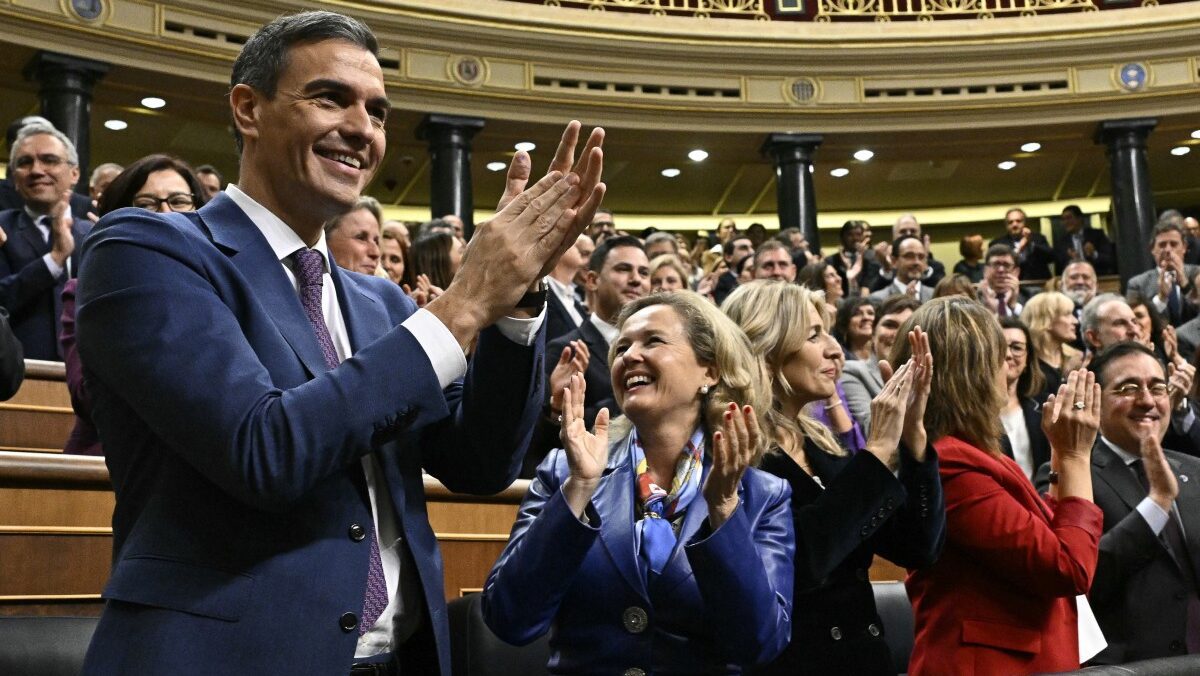
Photo by JAVIER SORIANO / AFP
Unfortunately, there were no surprises Thursday morning in Madrid in the Congress of Deputies. Pedro Sánchez, acting Prime Minister, formed a government for the third time in a row, with 179 votes in favor coming from his own party PSOE, plus those of Sumar, Junts Per Catalunya, Esquirra Republicana, Bildu, the Partido Basco National, the Galician Nationalist Party, and Coalición Canaria.
The 171 deputies of the Partido Popular, VOX, and Unión del Pueblo Narrava voted against Sánchez. He, in turn, promised during his speech to put up a “wall” of “democracy, coexistence, and tolerance,” against his opposition, which, despite having garnered significantly more votes in the July elections, were not able to form a government because of separatist and regionalist parties siding with Sánchez.
Sánchez before the vote proclaimed that his government would be “legitimate, democratic, and constitutional.” He also thanked the deputies of his own party for their trust in him.
“I know very well that it is very difficult to remain calm when we face the most serious accusations. I know how hard it is for you to see the houses of the people besieged and assaulted. I know how difficult it is to bear the signs held up against you,” he said, in reference to the weeks of protest in front of the socialist party headquarters in Madrid as well as large protests throughout the country.
Although the vote went exactly as expected, the PSOE did not have them all on board until the end. On Wednesday, in the hallways of Congress, Junts threatened to abstain on the first vote and thus force a second vote on Saturday, because MEP Carles Puigdemont did not like Sánchez’ speech, El Debate reports. Later, Sánchez self-amended in his reply to the spokesman for Puigdemont’s party, Junts per Catalunya, which satisfied the separatists, who will get an amnesty from Sánchez.
During the second and last investiture session, Sánchez only used a bellicose tone with the UPN deputy, Alberto Catalán, whom he reproached for siding with the PP when it had previously voted with the socialists.
“Each of us decides what side he’s on, and that side knows how it handles things,” said Sánchez.
The spokesman for the Basque extremist party Bildu did not reveal any details about its pact with the Sánchez for his investiture—the only pact that has not been made public. However, the political arm of now-defunct Basque terrorism did not miss the opportunity to vindicate its role in Spanish politics.
“We are the independentistas and sovereignists who prevent the reactionary bloc from coming to power, let no one forget,” the party’s spokesman declared.
As required by Puigdemont, the socialists have already registered a bill for an amnesty law that would wipe away charges—from corruption to drug dealing to public disorder—for separatists. The Partido Popular, which has spoken out constantly against the amnesty, has said, amazingly, that it will not use its majority in the Senate to block the law.
The next major issue will be Sánchez’ selection of ministers. Several in his current cabinet are expected to be removed while four new politicians from the far-left Sumar will be put in place, along with a couple of new socialist faces.
